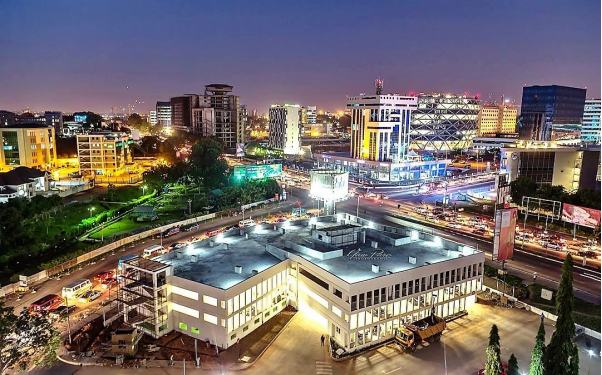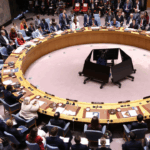
In Accra, the price of a kilo of tomatoes is up nearly 40% compared to last year. Inflation may be easing, but at 22.4% in March 2025, everyday costs still bite hard.
Friends in London tell a similar story: although the UK’s official inflation rate has fallen to 2.6%, most people don’t feel any richer; their wages haven’t really kept pace, and bills continue to climb.
In the US, inflation is slightly lower at 2.4%, but that hasn’t stopped rents, healthcare costs, and the endless drip of monthly subscription fees from squeezing wallets thin.
No wonder we mutter the same phrase from Kumasi to Kensington: “Nowhere cool.”
That phrase has become a kind of shorthand, a way to sum up the shared, simmering frustration that something is out of balance almost everywhere. It reflects not just economic discomfort but something deeper. There is a global unease with how modern life is structured. The cost of living is only part of the story. Beneath it runs anxiety about precarity, systems under strain, and a growing sense that today’s cities, even in their gleaming modernity, aren’t built for human thriving.
Why BNPL Signals a Deeper City Crisis.
Something unusual is happening in how we pay for everyday things. In the UK and US, you can now buy a simple burger and split the cost into about four payments. It’s not just for fashion or tech anymore. Basic meals and even concert tickets are increasingly being paid for in instalments. At this year’s Coachella festival, around 60% of general-admission tickets were bought on credit through Buy-Now-Pay-Later (BNPL) services. That whole BNPL sector is expected to cross $560 billion globally this year.
BNPL can help people manage tight budgets, yes, but if you need a loan to have dinner, it’s a warning sign. It means more people are living on borrowed comfort, not actual security.
In African cities, BNPL is growing fast too. It’s powered by mobile phones, informal jobs, and the pressure to keep up. But here’s the concern: if credit becomes the main way to feel included or “modern,” we’re building cities on shaky ground. True dignity shouldn’t rely on debt for basic needs. We need systems that let people thrive without stretching their wallets to breaking point.
Persons of Concern: the club no one queued for.
Once used to describe refugees, the term Persons of Concern (POCs) is quietly expanding to include teachers, nurses, and even software engineers. It now includes anyone living a paycheque away from arrears. It now includes everyday hardworking people who find themselves increasingly poorer and poorer, year after year, through no fault of their own. When survival dominates the lives of 60% of a city’s residents, innovation, ambition, and investment all falter.
What makes this shift more concerning is how invisible it is. Many POCs wear the mask of normalcy. They show up to work, smile at clients, and meet KPIs, all the while quietly rationing electricity, skipping meals, or delaying essential health checkups. The social contract weakens when middle-income earners become the working poor.
The Three-pillar antidote
In 2018, I argued that African cities must become:
1. Regionally Productive
2. Worldwide Connected
3. Self-Reliant
The framework still holds. However, the stakes are higher now, so it is important that we unpack these pillars again through a 2025 lens.
1. Regional Productivity
Productivity doesn’t just mean more output. It means useful output in sectors that matter, at scales that are inclusive, and with systems that reward long-term value.
• Ease borders inside the border. Ghana ranks fairly well for starting a business, yet contract enforcement and customs friction drag GDP. World Bank simulations suggest that streamlining these could lift national output by up to 2%. Businesses in Kumasi shouldn’t face more red tape sending goods to Accra than they would exporting to Abidjan.
• Skill up, spin up. Intra-African trade has reached $192 billion. There’s robust demand for goods made and branded on the continent. Yet our technical training systems often lag. There is a huge difference between a local skilled artisan and a local export-ready manufacturer. Yet, the gap is actually narrower than we think. We can bridge this gap, but only with the right support systems like maker spaces, certification hubs, and co-investment from diaspora networks.
• Localise supply chains. Cities must cultivate internal resilience. If 80% of a hospital’s PPE must come from abroad, then every border shock becomes a health crisis. Regional production hubs, especially for essentials like food, medicine, and construction inputs, are both strategic and economic priorities.
2. Worldwide Connectivity
Africa has often been plugged into global systems only as an extraction point. Examples are mining, raw exports, and data harvesting. But AfCFTA changes the game. It creates a platform for cities to negotiate their integration terms.
Thirty-seven African states are shipping under AfCFTA’s Guided Trade Initiative. Digitised customs, harmonised standards, and single-origin certification let businesses comply once and then access 54 markets. Cities that plug in early will enjoy network effects down the line.
But connectivity also means digital. Broadband penetration in some African capitals remains under 50%. Without reliable, affordable internet, everything from fintech inclusion to remote learning collapses. Urban investment must include fibre optics and public access points as basic infrastructure.
Let’s not forget cultural exports: Nollywood films, Ghanaian music, and Francophone fashion. These connect the continent to global youth culture. Policies should help creative industries formalise, scale, and retain ownership.
3. Self-Reliance
Africa still produces only around 80% of the food it consumes. But we have tools like AI-driven fertiliser maps, solar-powered cold chains, drought-resilient seeds, and many others. Urban-centred “agro-rings” could shield populations from price shocks and retain value locally.
This is where decentralised infrastructure becomes key. Imagine a circular economy that doesn’t just recycle plastic but repurposes organic waste into biofertiliser for peri-urban farms. Or rooftop gardens on housing estates linked to local feeding programmes. This can happen in real life, not just in sci-fi movies.
Self-reliance also includes energy. With falling solar prices and battery innovation, cities can aim to power health clinics, schools, and small factories independently. Mini-grids paired with local cooperatives can create jobs while ensuring reliability.
Five practical moves
1. Regulate micro-credit and BNPL. I own a micro-credit enterprise, but I am still an advocate for sustainable policies. Cap effective interest rates, enforce plain-language contracts, and link repayments to credit scores so users build a financial footprint.
2. Create Earn-Save-Spend-Later wallets. Match savings with credit access to nudge behaviour away from impulsive debt. Think of it as financial literacy embedded in design.
3. Bundle infrastructure with founder spaces. Every road built should add a solar mini-grid or a fabrication hub, letting SMEs capture value from the uplift. Industrial parks shouldn’t be isolated zones but integrated economic corridors.
4. Tie export rebates to SDGs. Reward firms whose shipments bear low-carbon tags and decent-labour stamps. Make ESG compliance not just moral but profitable.
5. Launch an African Food-Security Bond. Peg its returns to local crop yields, so farmers, citizens, and investors all gain when harvests do. This is not charity. This is climate-aligned finance.
Closing thought
If Persons of Concern don’t win, none of us will. But the scaffolding is already up. We have continental trade corridors, digital finance rails, climate-smart agriculture, and more. The work ahead is to weave these into self-sustaining cities/regions.
Where a burger or your groceries is paid for outright because wages cover the basics. Where BNPL funds tomorrow’s machinery, not yesterday’s lunch. Where regional exports, not remittances, drive household security.
Let’s get to work. Because somewhere ought to be cool. For now, it’s looking like #NowhereCool!
The author, Dr. Maxwell Ampong, serves as the CEO of Maxwell Investments Group. He is also an Honorary Curator at the Ghana National Museum and the Official Business Advisor with Ghana’s largest agricultural trade union under Ghana’s Trade Union Congress (TUC).
Founder of WellMax Inclusive Insurance and WellMax Micro-Credit, Dr. Ampong writes on relevant economic topics and provides general perspective pieces. ‘Entrepreneur In You’ operates under the auspices of the Africa School of Entrepreneurship, an initiative of Maxwell Investments Group.
DISCLAIMER: The Views, Comments, Opinions, Contributions and Statements made by Readers and Contributors on this platform do not necessarily represent the views or policy of Multimedia Group Limited.
DISCLAIMER: The Views, Comments, Opinions, Contributions and Statements made by Readers and Contributors on this platform do not necessarily represent the views or policy of Multimedia Group Limited.
- President Commissions 36.5 Million Dollars Hospital In The Tain District
- You Will Not Go Free For Killing An Hard Working MP – Akufo-Addo To MP’s Killer
- I Will Lead You To Victory – Ato Forson Assures NDC Supporters
Visit Our Social Media for More




